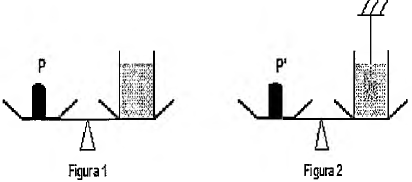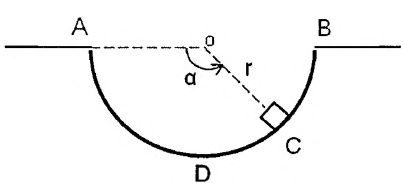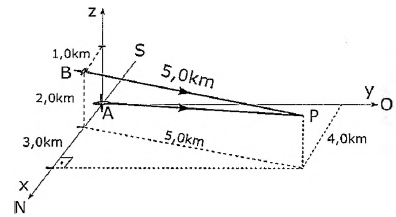Questões Militares
Nível médio
Foram encontradas 45.670 questões
Resolva questões gratuitamente!
Junte-se a mais de 4 milhões de concurseiros!
Analise a figura abaixo.

A figura acima mostra dois blocos A e B de massas m e 3m, respectivamente, ligados por uma corda inextensível e de massa desprezível passando por uma polia ideal sem atrito e através de um orifício O. No movimento da corda, considere que o orifício atua com uma força de atrito constante, F. Sabendo-se que a aceleração do sistema é g/3, onde g é a aceleração da gravidade, qual o módulo da força de atrito F ?
Observe as figuras abaixo.

As figuras mostram uma balança de dois pratos em dois
instantes diferentes, A figura 1 mostra um recipiente cheio
de água, de densidade pa, equilibrado por um peso P. Na
figura 2, um cubo de aresta a e densidade pc, pendurado
num fio, é mergulhado inteiramente na água do mesmo
recipiente sem tocar seu fundo. Que massa foi adicionada
ao prato da balança (figura 2) para que o equilíbrio fosse
restabelecido?
Analise a figura abaixo.

Um drone tipo quadcóptero sofre uma avaria durante um voo, sendo anulada a corrente no enrolamento de um de seus quatro motores (idênticos). Medições no circuito elétrico de alimentação dos motores (ver figura) mostram que, em relação aos valores anteriores à pane (V0 e 1), o valor da diferença de potencial V0’ é 20% maior, e o valor da corrente elétrica I' em duas das quatro baterias, de força eletromotriz ε e resistência interna r, é 40% menor. Nessas condições, a potência elétrica fornecida ao motor entre os terminais a e b variou, percentual mente, de:
Analise as figuras abaixo.

Cada uma das figuras acima mostra uma bobina de 200
espiras e um ímã cujos polos estão alinhados com o eixo
central da bobina. Sendo assim, assinale a opção correta.
Analise a figura abaixo.

A figura mostra um pequeno bloco de massa m, que inicialmente estava em repouso na posição A, e deslizou sobre a superfície sem atrito em uma trajetória circular ADB de raio r. Sendo g a aceleração da gravidade, qual o módulo da força exercida pela superfície sobre o bloco, ao passar pelo ponto C, em função do ângulo a indicado na figura?
Analise o gráfico abaixo.

Uma aeronave de patrulha A segue, com velocidade
escalar constante VA, rumo ao ponto P com a finalidade de
interceptar outra aeronave, B, a qual mantém altitude e
velocidade escalar constante e, inicialmente, encontra-se
1.00 km ao norte (sentido positivo de x) e 2,00 km acima
de A. Sabendo que a aeronave B percorre 5,00 km em
30.0 segundos antes de ser interceptada no ponto P, a
diferença, VA-VB, entre as velocidades escalares das duas
aeronaves, em km/h, é igual a:
Prison without guards or weapons in Brazil
Tatiane Correia de Lima is a 26-year-old mother of two who is serving a 12-year sentence in Brazil. The South American country has the world’s fourth largest prison population and its jails regularly come under the spotlight for their poor conditions, with chronic overcrowding and gang violence provoking deadly riots.
Lima had just been moved from a prison in the mainstream penitential system to a facility run ______(1) the Association for the Protection and Assistance to Convicts (APAC) in the town of Itaúna, in Minas Gerais state. Unlike in the mainstream system, “which steals your femininity”, as Lima puts it, at the APAC jail she is allowed to wear her own clothes and have a mirror, make-up and hair dye. But the difference between the regimes is far more than skin-deep.
The APAC system has been gaining growing recognition as a safer, cheaper and more humane answer to the country’s prison crisis. All APAC prisoners must have passed through the mainstream system and must show remorse and be willing to follow the strict regime of work and study which is part of the system’s philosophy. There are no guards or weapons and visitors are greeted by an inmate who unlocks the main door to the small women’s jail.
Inmates are known as recuperandos (recovering people), reflecting the APAC focus ______(2) restorative justice and rehabilitation. They must study and work, sometimes in collaboration with the local community. If they do not - or if they try to abscond - they risk being returned to the mainstream system. There have been physical fights but never a murder at an APAC jail.
Adapted from https://www.bbc.com/news/world-latin-america-44056946
Prison without guards or weapons in Brazil
Tatiane Correia de Lima is a 26-year-old mother of two who is serving a 12-year sentence in Brazil. The South American country has the world’s fourth largest prison population and its jails regularly come under the spotlight for their poor conditions, with chronic overcrowding and gang violence provoking deadly riots.
Lima had just been moved from a prison in the mainstream penitential system to a facility run ______(1) the Association for the Protection and Assistance to Convicts (APAC) in the town of Itaúna, in Minas Gerais state. Unlike in the mainstream system, “which steals your femininity”, as Lima puts it, at the APAC jail she is allowed to wear her own clothes and have a mirror, make-up and hair dye. But the difference between the regimes is far more than skin-deep.
The APAC system has been gaining growing recognition as a safer, cheaper and more humane answer to the country’s prison crisis. All APAC prisoners must have passed through the mainstream system and must show remorse and be willing to follow the strict regime of work and study which is part of the system’s philosophy. There are no guards or weapons and visitors are greeted by an inmate who unlocks the main door to the small women’s jail.
Inmates are known as recuperandos (recovering people), reflecting the APAC focus ______(2) restorative justice and rehabilitation. They must study and work, sometimes in collaboration with the local community. If they do not - or if they try to abscond - they risk being returned to the mainstream system. There have been physical fights but never a murder at an APAC jail.
Adapted from https://www.bbc.com/news/world-latin-america-44056946
Prison without guards or weapons in Brazil
Tatiane Correia de Lima is a 26-year-old mother of two who is serving a 12-year sentence in Brazil. The South American country has the world’s fourth largest prison population and its jails regularly come under the spotlight for their poor conditions, with chronic overcrowding and gang violence provoking deadly riots.
Lima had just been moved from a prison in the mainstream penitential system to a facility run ______(1) the Association for the Protection and Assistance to Convicts (APAC) in the town of Itaúna, in Minas Gerais state. Unlike in the mainstream system, “which steals your femininity”, as Lima puts it, at the APAC jail she is allowed to wear her own clothes and have a mirror, make-up and hair dye. But the difference between the regimes is far more than skin-deep.
The APAC system has been gaining growing recognition as a safer, cheaper and more humane answer to the country’s prison crisis. All APAC prisoners must have passed through the mainstream system and must show remorse and be willing to follow the strict regime of work and study which is part of the system’s philosophy. There are no guards or weapons and visitors are greeted by an inmate who unlocks the main door to the small women’s jail.
Inmates are known as recuperandos (recovering people), reflecting the APAC focus ______(2) restorative justice and rehabilitation. They must study and work, sometimes in collaboration with the local community. If they do not - or if they try to abscond - they risk being returned to the mainstream system. There have been physical fights but never a murder at an APAC jail.
Adapted from https://www.bbc.com/news/world-latin-america-44056946
Lego wants to replace plastic blocks with sustainable materials
The Lego Group wants to replace the plastic in their products with a “sustainable material” by 2030, the company announced.
The world’s largest toy company will invest $1 billion in their new LEGO Sustainable Materials Centre in Denmark, which _______(1) devoted to finding and implementing new sustainable alternatives for their current building materials. Lego plans on hiring 100 specialists for the center. There is no official definition of a sustainable material.
Legos _______(2) made with a strong plastic known as acrylonitrile butadiene styrene since 1963. The company uses more than 6,000 tons of plastic annually to manufacture its products, according to NBC News. Changing the raw material could have a large effect on Lego’s carbon footprint, especially considering that only 10% of the carbon emissions from Lego products come from its factories. The other 90% is produced from the extraction and refinement of raw materials, as well as distribution from factories to toy stores.
The company _______(3) already taken steps to lower its carbon footprint, including a reduction of packaging size and an investment in an offshore wind farm.
Adapted from http://time.com/3931946/lego-sustainable-materials/
Lego wants to replace plastic blocks with sustainable materials
The Lego Group wants to replace the plastic in their products with a “sustainable material” by 2030, the company announced.
The world’s largest toy company will invest $1 billion in their new LEGO Sustainable Materials Centre in Denmark, which _______(1) devoted to finding and implementing new sustainable alternatives for their current building materials. Lego plans on hiring 100 specialists for the center. There is no official definition of a sustainable material.
Legos _______(2) made with a strong plastic known as acrylonitrile butadiene styrene since 1963. The company uses more than 6,000 tons of plastic annually to manufacture its products, according to NBC News. Changing the raw material could have a large effect on Lego’s carbon footprint, especially considering that only 10% of the carbon emissions from Lego products come from its factories. The other 90% is produced from the extraction and refinement of raw materials, as well as distribution from factories to toy stores.
The company _______(3) already taken steps to lower its carbon footprint, including a reduction of packaging size and an investment in an offshore wind farm.
Adapted from http://time.com/3931946/lego-sustainable-materials/
Lego wants to replace plastic blocks with sustainable materials
The Lego Group wants to replace the plastic in their products with a “sustainable material” by 2030, the company announced.
The world’s largest toy company will invest $1 billion in their new LEGO Sustainable Materials Centre in Denmark, which _______(1) devoted to finding and implementing new sustainable alternatives for their current building materials. Lego plans on hiring 100 specialists for the center. There is no official definition of a sustainable material.
Legos _______(2) made with a strong plastic known as acrylonitrile butadiene styrene since 1963. The company uses more than 6,000 tons of plastic annually to manufacture its products, according to NBC News. Changing the raw material could have a large effect on Lego’s carbon footprint, especially considering that only 10% of the carbon emissions from Lego products come from its factories. The other 90% is produced from the extraction and refinement of raw materials, as well as distribution from factories to toy stores.
The company _______(3) already taken steps to lower its carbon footprint, including a reduction of packaging size and an investment in an offshore wind farm.
Adapted from http://time.com/3931946/lego-sustainable-materials/
(Título omitido propositadamente)
Italian children have been told not to turn up to school unless they can prove they have been properly vaccinated. The deadline follows months of national debate over compulsory vaccination. The new law came amid a surge in measles cases - but Italian officials say vaccination rates have improved since it was introduced. Children must receive a range of mandatory immunisations before attending school. They include vaccinations for chickenpox, polio, measles, mumps and rubella.
Children up to the age of six years will be excluded from nursery and kindergarten without proof of vaccination under the new rules. Those aged between six and 16 cannot be banned from attending school, but their parents face fines if they do not complete the mandatory course of immunisations.
Italian media report that regional authorities are handling the situation in a number of different ways. In Bologna, the local authority has set letters of suspension to the parents of some 300 children, and a total of 5,000 children do not have their vaccine documentation up to date. In other areas there have been no reported cases, while still others have been given a grace period of a few days beyond the deadline.
The new law was passed to raise Italy’s dropping vaccination rates from below 80% to the World Health Organisation’s 95% target.
Adapted from https://www.bbc.com/news/world-europe-47536981
(Título omitido propositadamente)
Italian children have been told not to turn up to school unless they can prove they have been properly vaccinated. The deadline follows months of national debate over compulsory vaccination. The new law came amid a surge in measles cases - but Italian officials say vaccination rates have improved since it was introduced. Children must receive a range of mandatory immunisations before attending school. They include vaccinations for chickenpox, polio, measles, mumps and rubella.
Children up to the age of six years will be excluded from nursery and kindergarten without proof of vaccination under the new rules. Those aged between six and 16 cannot be banned from attending school, but their parents face fines if they do not complete the mandatory course of immunisations.
Italian media report that regional authorities are handling the situation in a number of different ways. In Bologna, the local authority has set letters of suspension to the parents of some 300 children, and a total of 5,000 children do not have their vaccine documentation up to date. In other areas there have been no reported cases, while still others have been given a grace period of a few days beyond the deadline.
The new law was passed to raise Italy’s dropping vaccination rates from below 80% to the World Health Organisation’s 95% target.
Adapted from https://www.bbc.com/news/world-europe-47536981
(Título omitido propositadamente)
Italian children have been told not to turn up to school unless they can prove they have been properly vaccinated. The deadline follows months of national debate over compulsory vaccination. The new law came amid a surge in measles cases - but Italian officials say vaccination rates have improved since it was introduced. Children must receive a range of mandatory immunisations before attending school. They include vaccinations for chickenpox, polio, measles, mumps and rubella.
Children up to the age of six years will be excluded from nursery and kindergarten without proof of vaccination under the new rules. Those aged between six and 16 cannot be banned from attending school, but their parents face fines if they do not complete the mandatory course of immunisations.
Italian media report that regional authorities are handling the situation in a number of different ways. In Bologna, the local authority has set letters of suspension to the parents of some 300 children, and a total of 5,000 children do not have their vaccine documentation up to date. In other areas there have been no reported cases, while still others have been given a grace period of a few days beyond the deadline.
The new law was passed to raise Italy’s dropping vaccination rates from below 80% to the World Health Organisation’s 95% target.
Adapted from https://www.bbc.com/news/world-europe-47536981
Teaching English in the Brazilian countryside
“In Brazil, countryside youth want to learn about new places, new cultures and people. However, they think their everyday lives are an obstacle to that, because they imagine that country life has nothing to do with other parts of the world”, says Rafael Fonseca. Rafael teaches English in a language school in a cooperative coffee cultivation in Paraguaçu. His learners are the children of rural workers.
Rafael tells us that the objective of the project being developed in the cooperative is to give the young people more opportunities of growth in the countryside, and that includes the ability to communicate with international buyers. “In the future, our project may help overcome the lack of succession in countryside activities because, nowadays, rural workers’ children become lawyers, engineers, teachers, and sometimes even doctors, but those children very rarely want to have a profession related to rural work”, says Rafael.
“That happens”, he adds, “because their parents understand that life in the countryside can be hard work and they do not want to see their children running the same type of life that they have. Their children also believe that life in the country does not allow them to have contact with other parts of the world, meet other people and improve cultural bounds. The program intends to show them that by means of a second language they can travel, communicate with new people and learn about new cultures as a means of promoting and selling what they produce in the country, and that includes receiving visitors in their workplace from abroad.”
Rafael’s strategy is to contextualize the English language and keep learners up-to-date with what happens in the global market. “Integrating relevant topics about countryside living can be transformative in the classroom. The local regional and cultural aspects are a great source of inspiration and learning not only for the young, but for us all.”
Adapted from http://www.cambridge.org/elt/blog/2019/01/21/teaching-english-in-the-brazilian-classroom/
According to the text, read the statements and choose the correct alternative.
I. Rafael tries to show them that their everyday lives are not an obstacle.
II. Those children’s parents don’t want them to attend university.
III. Rafael brings classroom topics close to what the children see and live.
IV. Those children may replace their parents in the future as rural workers.
V. The language school reaffirms that country life has nothing to do with other parts of the world.
Teaching English in the Brazilian countryside
“In Brazil, countryside youth want to learn about new places, new cultures and people. However, they think their everyday lives are an obstacle to that, because they imagine that country life has nothing to do with other parts of the world”, says Rafael Fonseca. Rafael teaches English in a language school in a cooperative coffee cultivation in Paraguaçu. His learners are the children of rural workers.
Rafael tells us that the objective of the project being developed in the cooperative is to give the young people more opportunities of growth in the countryside, and that includes the ability to communicate with international buyers. “In the future, our project may help overcome the lack of succession in countryside activities because, nowadays, rural workers’ children become lawyers, engineers, teachers, and sometimes even doctors, but those children very rarely want to have a profession related to rural work”, says Rafael.
“That happens”, he adds, “because their parents understand that life in the countryside can be hard work and they do not want to see their children running the same type of life that they have. Their children also believe that life in the country does not allow them to have contact with other parts of the world, meet other people and improve cultural bounds. The program intends to show them that by means of a second language they can travel, communicate with new people and learn about new cultures as a means of promoting and selling what they produce in the country, and that includes receiving visitors in their workplace from abroad.”
Rafael’s strategy is to contextualize the English language and keep learners up-to-date with what happens in the global market. “Integrating relevant topics about countryside living can be transformative in the classroom. The local regional and cultural aspects are a great source of inspiration and learning not only for the young, but for us all.”
Adapted from http://www.cambridge.org/elt/blog/2019/01/21/teaching-english-in-the-brazilian-classroom/